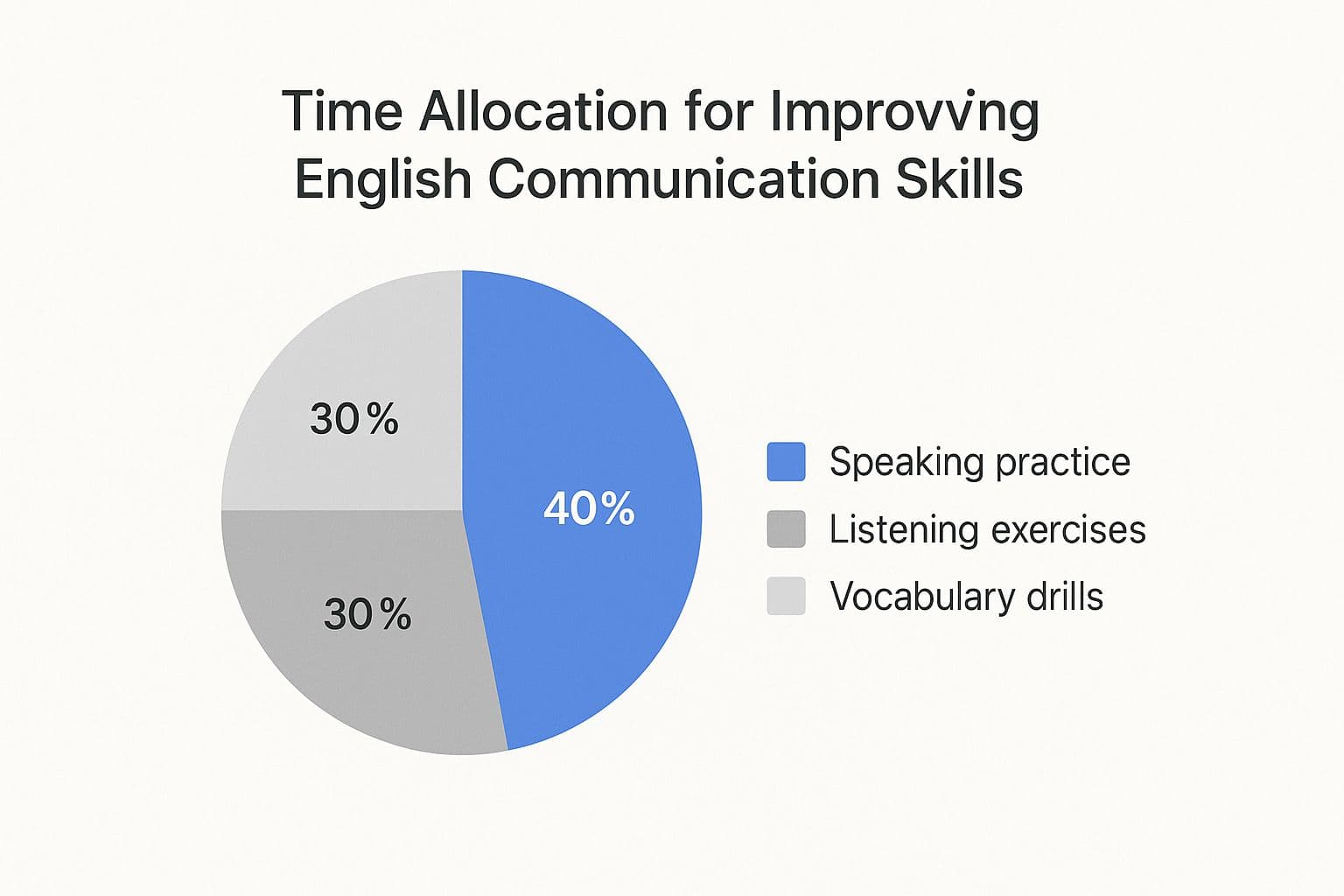Improve English Communication Skills Quickly & Effectively
Learn proven strategies to improve English communication skills with practical techniques that enhance speaking, listening, and writing abilities.

The Hidden Career Advantage of English Mastery
When you decide to improve your English communication skills, you're doing a lot more than just learning a new language. You're building a powerful career asset that many people don't talk about. It’s not about memorizing vocabulary or acing grammar tests. The real benefit comes from being able to share your ideas confidently, convince a doubtful coworker, or create a real connection with a client from another country. This is the skill that can give you a serious edge in your career.

Think about it from a manager's point of view. Who are they more likely to promote? The employee with excellent technical skills who can't explain their work clearly, or the one who can articulate a project's value and get their team excited about it? The choice is pretty obvious. Strong communication is a clear indicator of leadership potential, and companies actively look for and reward people who have it. This is why professionals with top-notch English skills often climb the career ladder faster and earn more—it's a direct result of their ability to influence, negotiate, and connect.
From Ideas to Impact
Let's imagine a real-world situation. A brilliant software developer has a great idea for a new product feature. In a team meeting, she doesn’t just drone on about the technical details. Instead, she uses descriptive language to explain how this feature will solve a huge problem for customers and drive more revenue. She answers questions clearly and without hesitation. Her managers see more than just a programmer; they see a future leader who connects technical work to the company's bottom line. This is where mastering English makes a huge difference—it turns your knowledge into real influence.
This ability to connect is more critical than ever. It's estimated that by the end of 2025, 1.5 billion people will speak English, but only around 25% of them will be native speakers. This means most professional conversations happen between non-native speakers, making clarity and understanding absolutely essential. You can learn more about how widely English is spoken from this linguistic resource.
Opening Doors to New Opportunities
Improving your English communication doesn’t just help you in your current job; it can create new career paths you never even thought about. Suddenly, opportunities like leading an international team, speaking at a global conference, or moving for a dream job abroad seem within reach. Excellent communication can also help you become a recognized expert in your industry. If you want to see how communication can boost your professional profile, you can explore some effective strategies for thought leadership. Working to improve your English skills is truly an investment in a future with more possibilities.
Smart Listening Strategies That Actually Work
To really improve your English, you need to treat listening like an active workout for your brain, not just background noise. Lots of learners get stuck in the trap of passively watching movies with subtitles, just hoping the language will sink in. While it’s better than nothing, that method doesn't build the deep understanding you need for real-world conversations. The trick is to switch from just hearing to actively listening.
This change in mindset is all about engaging with what you're hearing. For instance, instead of letting a podcast play in the background during your commute, try a more focused exercise. Listen to a short, one-minute part without any other distractions. Then, hit pause and try to say the main points out loud. This simple action makes your brain actually process the information instead of letting it wash over you. It turns that "dead time" into a productive learning session.
Choosing Your Listening Arena
What you listen to is just as important as how you listen. A common mistake is picking something that's either way too easy or so hard it's just frustrating. You need to find that "sweet spot" that challenges you enough to keep you interested but doesn't make you want to give up. Think of it like a video game: you want the level to be excitingly difficult, not impossibly hard.
Here’s how you can find material at your level:
- Podcasts for Your Hobbies: Find a podcast about something you already love, like gaming, cooking, or history. Your existing knowledge gives you context, which makes it much easier to follow along and pick up new words naturally.
- Graded News Stories: Look for news websites made for English learners. They often talk about current events using simpler language and speak more slowly, which is great for building confidence.
- YouTube Channels on Familiar Topics: Watch tutorials or reviews about subjects you already know well in your own language. This helps you connect new English words to concepts you've already mastered.
The idea is to build a big passive vocabulary—these are the words you recognize when you hear or read them. The more you listen effectively, the more you'll understand in actual conversations, which is the foundation for speaking with confidence.
To help you decide which listening practice to try, here's a quick comparison of different methods.
| Method | Effectiveness | Time Required | Best For | Difficulty Level |
|---|---|---|---|---|
| Active Listening (Summarizing) | High | 15-20 mins daily | Building deep comprehension and recall. | Medium to Hard |
| Podcast Listening (Specific Topics) | Medium | 30-60 mins daily | Expanding vocabulary in areas of interest. | Varies by topic |
| Watching TV/Movies with Subtitles | Low to Medium | 1-2 hours | Getting used to natural speech flow and rhythm. | Easy to Medium |
| Graded News Stories | High | 10-15 mins daily | Learning formal vocabulary and sentence structures. | Easy to Medium |
| YouTube Tutorials | Medium | 20-30 mins daily | Learning practical, context-specific language. | Varies by topic |
This table shows there are many ways to practice, each with its own benefits. Active, focused exercises tend to be more effective for deep learning, while more passive methods are good for getting exposure to the language's natural sound.
Active Listening in Practice
A balanced approach is the key to making steady progress. For anyone trying to improve their English communication, putting time into both speaking and listening is usually the most effective strategy. This chart gives a good idea of how you might want to split your practice time.

As you can see, listening exercises make up a huge chunk—almost one-third—of a solid learning plan, right alongside speaking. Don't just hear English; train your ear to catch its rhythm, intonation, and speed. When you do that, you’re not just learning words; you’re learning how the language actually sounds and flows in real life.
Speaking Confidently Despite Imperfect Grammar

Let’s be honest, the biggest thing holding most people back from speaking English isn't a lack of words or grammar rules—it's fear. The worry about making a mistake, sounding unnatural, or being judged can be completely paralyzing. But here’s the thing: the point of communication isn't to be perfect; it's to connect with people. In almost any professional setting, a message delivered with confidence, even with a few small errors, is way more effective than a grammatically flawless sentence that you were too scared to say. To really improve your English communication skills, you have to switch your focus from getting everything right to getting your point across clearly.
This change starts in your head. A lot of learners get bogged down trying to translate every thought from their native language. This is not only slow but often leads to clunky, awkward phrasing. A much better approach is to start thinking directly in English. It sounds intimidating, but you can start small. Narrate your daily activities to yourself, inside your head: "I am walking to the kitchen. I am going to make coffee." It feels a bit silly at first, but this simple exercise builds the mental pathways that make speaking feel more automatic and natural.
From Anxiety to Actionable Steps
Getting over speaking anxiety is a journey of small, steady wins. The secret is to create low-pressure situations where you can practice and where mistakes don't feel like a big deal. This can be tricky, especially if you don’t have someone to talk with regularly.
Here are a few practical exercises you can do on your own to build that speaking muscle:
- Shadowing Audio: Grab a short audio clip of a native speaker. Listen to one sentence, hit pause, and then repeat it. Try to mimic the rhythm and intonation. This isn't about perfect pronunciation; it's about feeling the "music" of the language.
- Record Yourself: Choose a simple topic you know well and talk about it for just one minute. Use your phone to record it, then listen back. You'll start to notice your own common hesitations or filler words, which is the first step to fixing them.
- The "One-Idea" Rule: In your next meeting, set a tiny goal: contribute just one idea or ask one question. This takes the pressure off and helps build the habit of participating.
This kind of hands-on practice really pays off. Global data shows that English proficiency often hits its peak at a certain point in life. The EF English Proficiency Index for 2023 revealed that adults aged 26 to 40 generally have the highest scores. This is likely because career demands push them to make a dedicated effort during these years. You can dig into more of these trends by checking out the global English proficiency rankings.
At the end of the day, remember that your accent is part of who you are, not something to be ashamed of. Real confidence comes from accepting that your grammar might not be perfect and speaking anyway. If you're worried about making the same mistakes over and over, it can be helpful to look over some of the most common grammar errors just to be aware of them. The best communicators aren't the ones who never stumble; they're the ones who recover gracefully and keep the conversation going.
Reading for Communication (Not Just Comprehension)
A lot of us think of reading as a quiet way to learn new words, but it’s so much more. When you read strategically, it becomes an active exercise that sharpens all your English communication skills. You're not just following a story's plot; you're absorbing the rhythm, style, and structure that make communication click.
Imagine you want to learn how to cook a signature dish from a famous chef. You wouldn’t just glance at the ingredient list. You’d watch how they chop the vegetables, manage the heat, and plate the final meal. Reading for better communication is the same principle. You’re watching how a skilled writer builds an argument, lands a joke, or unpacks a tricky subject. This gives you a much deeper insight than just memorizing vocabulary.
Finding Material That Teaches You to Communicate
The trick is to read things that sound like the way you want to communicate. Classic literature has its place, but if your goal is practical, everyday communication, your reading list should reflect that.
Here’s what you should be looking for:
- Well-Written Articles and Blog Posts: Find writers in your industry or field of interest who are known for their clarity. Pay attention to how they structure their points. This is a goldmine for learning how to write more persuasive emails or clearer reports at work.
- Modern Fiction with Realistic Dialogue: Reading contemporary novels is a fantastic way to pick up the natural flow of conversation. You'll see how people use slang, humor, and cultural references in a way that textbooks can never capture.
- Biographies and Memoirs: These books are masterclasses in storytelling. They show you how to connect with people on an emotional level and hold their attention.
If you’re not sure where to start, platforms like Goodreads can be a huge help in finding books that fit your interests and reading level.
Using communities like this helps you find books with engaging dialogue and modern language that you'll actually enjoy reading. The most important rule is to be consistent. Research shows that having a large passive vocabulary—the words you recognize from reading and listening—is essential for keeping up with real-time conversations.
Don't feel like you have to stop and look up every unfamiliar word. Instead, try to grasp the overall meaning from context and pay close attention to how the writer gets their message across. This simple shift turns reading from a passive hobby into a powerful tool in your communication toolkit.
Writing That Gets Results (Not Just Good Grades)
In the professional world, writing isn't about scoring points with an English teacher for using fancy words; it's about getting things done. A clear email gets a fast, helpful reply. A sharp report shapes a major decision. Effective writing is a practical tool for reaching your goals, and getting good at it is a key part of how you improve your English communication skills. The best part? Crafting clear, professional writing is a skill you can definitely build with some focused effort.
One of the biggest traps for non-native speakers is the urge to overcomplicate things. We sometimes try to sound "smarter" with long sentences or advanced vocabulary, but this often backfires, making our message muddy and confusing. The real goal should always be clarity over complexity. Instead of aiming to sound like a textbook, try to sound like a clear-thinking colleague. This means breaking down big ideas into shorter, more direct sentences.
From Jumbled to Clear: A Practical Approach
Let's imagine a common task: writing a project update email. Your first attempt might be a long, winding message filled with technical terms. A much better version gets straight to the point, focusing only on what your reader absolutely needs to know.
Here’s how to make that happen:
- Lead with the punchline: Don't make your reader hunt for the main idea. Start with the most critical piece of information, like, "The project is on schedule, and we've successfully completed Phase 1."
- Use simple language: Swap out complicated words for their simpler cousins. Instead of "utilize," just say "use." Instead of "subsequently," try "next."
- Keep your paragraphs short: Aim for one main idea per paragraph. This makes your writing much easier to scan and understand, which is a lifesaver for busy coworkers.
To put this into perspective, let's look at how focusing on different writing skills can affect your professional life. The table below breaks down the impact, effort, and benefits of improving specific areas of your writing.
| Skill Area | Impact on Clarity | Professional Benefit | Practice Time | Difficulty to Master |
|---|---|---|---|---|
| Grammar & Punctuation | High | Builds credibility and trust. Prevents misinterpretation. | 15-20 min/day | Medium |
| Sentence Structure | Very High | Makes information easy to digest. Keeps readers engaged. | 20-30 min/day | High |
| Vocabulary (Clarity) | High | Ensures your message is understood by a wide audience. | 10-15 min/day | Medium |
| Tone & Formality | Medium | Helps you adapt to different professional contexts. | 10 min/day | Low |
| Editing & Proofreading | Very High | Catches errors that undermine your professionalism. | 5-10 min/draft | Low |
As you can see, small, consistent efforts in areas like editing can have a huge impact on how your message is received. Mastering sentence structure might take more time, but the payoff in clarity is massive.
The Power of Self-Editing
Think of writing as just organized thinking on paper. The best writers rarely get it perfect on the first go; they sharpen their ideas through editing. Once you've written something, step away for a few minutes, then come back and read it out loud. You'll be surprised how quickly you catch awkward phrases and clunky sentences this way.
For a deeper look at practical exercises, check out our guide on how to improve your writing skills. To really fine-tune your work and get hands-on experience, you can also explore an online editor tool that helps you spot mistakes and improve clarity. This cycle of writing and refining is what builds the muscle for powerful, goal-oriented communication.
Designing Your Personal Learning System
Generic advice often falls flat because a one-size-fits-all approach just doesn't work. The real key to making progress is to build a practice routine that fits your actual life, not some perfect, imaginary schedule. To actually improve your English communication skills, you need a system built around your unique needs, goals, and daily rhythm. This all starts with an honest look at where you are right now.
Forget about vague goals like "get better at speaking." Let's get specific. Do you freeze up trying to find the right words in meetings? Or is your main challenge understanding your fast-talking colleagues? Pinpointing these exact pain points lets you create exercises that deliver real results without feeling like a chore. The idea is to weave practice into the life you already have.
Integrating Practice Into Your Daily Flow
You don't need to block out huge chunks of time to see improvement. The most successful learners I know are masters at turning "dead time" into productive practice sessions.
- Morning Routine: As you're making coffee, try narrating what you're doing in English, either out loud or just in your head. It's a simple act that starts building the crucial habit of thinking in English.
- Commute Time: Instead of just listening to music, switch to a podcast on a topic you genuinely find interesting. When you arrive, challenge yourself to summarize one key idea you heard.
- Evening Wind-Down: Before bed, spend just 10 minutes writing a few sentences in a journal about your day. It’s a super low-pressure way to practice expressing your own thoughts and experiences. For tips on making this quicker, check out our guide on how to write faster and better.
This approach of slotting learning into daily life is a common thread among successful language learners everywhere. The difference in proficiency levels across countries often comes down to environment and consistent exposure. For example, the EF English Proficiency Index 2025 shows countries like the Netherlands (scoring 661) and Singapore (scoring 642) at the top, partly because English is so integrated into their daily life and education. You can check out more of these English proficiency rankings across the globe to see how different places stack up.
Staying Consistent and Motivated
Let's be real: motivation is never constant. It goes up and down. That's exactly why having a system is so important—it's what keeps you going when inspiration takes a day off. Track your progress in a way that feels meaningful to you. Maybe it's noting down one new phrase you used in a conversation or celebrating the fact that you spoke up in a meeting. These small wins are the fuel that keeps you moving.
It also helps to find an accountability partner who gets your goals. You want someone who can offer encouragement, not just pressure. Your personal learning system should feel supportive and sustainable, because it's designed for your real-world progress, not for perfection.
Your Roadmap to Lasting Progress
Knowing what to do is one thing, but turning that knowledge into real, consistent action is where the magic happens. To truly see a lasting improvement in your English communication, you need a solid action plan. This isn't about cramming more study time into your already busy schedule; it's about making the time you do have more effective.
Daily, Weekly, and Monthly Practices
The best way to build a skill is through small, consistent efforts that stack up over time. Think of it as creating layers of learning that reinforce each other.
- Daily (15-20 minutes): Your daily goal is simple: get some exposure and practice recall. This could be as easy as listening to a five-minute news podcast on your commute and then trying to summarize the main points in your head. Or, you could jot down three sentences in a journal about your day. The idea is to weave English into your daily rhythm so it becomes a natural habit.
- Weekly (1-2 hours): Set aside a dedicated block of time each week for more focused, active work. This is your chance to tackle a specific challenge. You could schedule a 30-minute chat with a language partner, record yourself speaking on a topic for two minutes and listen back for crutch words, or draft a detailed email to a colleague and edit it for clarity and tone.
- Monthly (2-3 hours): Use a monthly check-in to look at the bigger picture. Review your journal entries or listen to your recordings from the start of the month. Can you see a difference? Maybe you're still saying "um" a lot. This is the perfect time to set a new, concrete goal for the next month, like, "I'm going to practice speaking with a timer to reduce my use of filler words."
Staying Motivated and on Track
Momentum is your best friend when learning a new skill. The secret to staying motivated is to notice and appreciate the small victories along the way. Did you successfully get your point across in a team meeting? That’s a huge win! Acknowledging these moments gives you the fuel to keep pushing forward.
It also helps to find an accountability partner who gets what you're trying to achieve. They aren't there to pressure you, but to offer a bit of encouragement when you feel stuck. Remember, progress is never a perfectly straight line. You'll have busy weeks and moments of frustration. Your roadmap is there to gently guide you back, reminding you that every small step is a solid investment in yourself.
Ready to make your writing and editing workflow faster and smarter? With TypeBoost, you can apply your own custom AI prompts to any text, in any app, with a simple keyboard shortcut. Stop copy-pasting and start communicating with perfect clarity and tone, every time. Discover how TypeBoost can elevate your communication today.